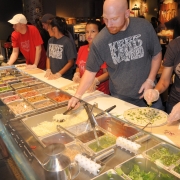This Entrepreneur Gives The Homeless Free Meals Every Single Day.
There is no one-size-fits-all approach to success when it comes to entrepreneurship. Innovative individuals come in all different shapes and sizes and each is fueled by a unique passion that keeps them going even in the face of the overwhelming obstacles that arise on the path to prosperity. For restaurant owner Kazi Mannan, his entrepreneurship is fueled by his faith and his inherent desire to help his fellow man. And in an era where everyone is divided by politics, Mannan’s unwavering love and generosity are a breath of fresh air in Washington, D.C.
There are dozens of Halal restaurants around the D.C. area, but none are as unique as Sakina Halal Grill. Sure, the food might be delicious and the atmosphere most welcoming, but Mannan is the gem that makes the place truly extraordinary.
Named for his mother, Sakina, the restaurant is just a few blocks from the White House. Upon first glance, the dining room might not look that different from other high-end establishments—except for one thing: if you come during the lunchtime rush, you will notice some of D.C.’s homeless population enjoying a meal.
A Very Good Deed
Since Kazi Mannan took over ownership of the establishment in 2013, he has been giving free meals away to the homeless every single day. And no one has ever been turned away due to an inability to pay.
“The day I took over, I brought in all of the homeless people that I could find, and I said, ‘You eat for free.’ They didn’t believe me. They sat down in the dining room and said, ‘Are you sure you’re not going to charge us?’” Mannan told a local news source. He continued, “They thought that I was tricking them, but I told them, ‘This is your place to eat. As long as I own it, this is your place.’ So now they can dine-in or takeout for free.”
Mannan estimates that he has given away nearly 16,000 free meals over the years to those who could not afford to pay. One man has even come in twice a day for the last four years, and he is always greeted warmly with a smile and given a meal, no questions asked. The restaurant has gotten to know so many of the homeless individuals who come in, they have even memorized their orders by heart. Mannan even started offering the most tender cuts of meat to those whose drug addictions and lifestyles had caused them teeth problems.
Mannan said:
“We have so many that are like a regular guest. We know them and what they want to eat. Some have teeth problems so we give them boneless chicken, tender ones. For some, the alcohol and the drugs, a lot of people have teeth problems.”
Instead of merely offering free meals to-go, Mannan lets his guests sit in the dining room just like all the other customers so that they may enjoy a few minutes of dignity before returning back to the streets. “If you can’t afford a meal, come in and have a free meal. Enjoy the same atmosphere that everybody who is paying is enjoying,” Mannan insists.
While he is doing these guests a great service by feeding them regularly, he seems to think that he is the lucky one in this situation. “Today, I have so many homeless friends. I have phone numbers and get texts from them all of the time … That’s what I want. I want them to see me as their friend. And, I want others to see them as human beings.”
For Mannan, the plight of the individuals he serves hits close to home. It wasn’t so long ago when he was living in poverty, dreaming of the day he could finally afford to run his own restaurant.
Striving For The American Dream
Mannan is a living testament to the American Dream. “It was always my dream to overcome poverty and own a restaurant. And, that’s what I did,” he said.
When the Pakistani-born immigrant first came to this country in 1996, he had three dollars in his pocket and a heart full of dreams. Born and raised in a town without plumbing or electricity, he left his wife and family behind in order to secure a better future for them. Living in Washington, D.C. presented a world full of possibilities. Mannan recalls first arriving in the country:
“When I got to D.C., it’s funny, but the first thing I wanted to do was go jogging. I saw Americans working out and running, and I thought it was so cool. I wanted to do it. But, I didn’t own any tennis shoes. So here I was, this guy running around D.C. without any tennis shoes on.”
After his jog around the city, Mannan got right to work saving money so that his family back in Pakistan could have a better life. He started working at a gas station until he could save enough money to start his own limousine service, which he did within a few years. Mannan still owns that limo service today, where he makes it a practice to hire other immigrants just like him who are new to this country and striving to better their lives.
Mannan lives to serves others, just as his mother taught him to do back home in Pakistan. Even though they were destitute during his childhood, his mother often sacrificed in order to serve others. He has taken that principle and applied it to his business practices where he is always extremely generous.
“I am very blessed to have a truly amazing family. My mother taught me to be generous and give with my time. Because remember, we were broke. But, if we had a guest visit, she would make tea and welcome them into our home. She gave everything of herself. I’m trying to teach that to my family too.”
Mannan’s son just started school in Virginia and when he is not studying, he is in the kitchen working. As a man of faith, Mannan believes it is his responsibility to lead by example and show love and generosity to all those he meets. He said:
“I’m a Muslim-American. And I like to believe that when I’m giving to the poor and hungry, God sees that. Just the act of giving a smile to someone can be a blessing. Just think about what food has the power to do.”
Good Practices Pay Off
As the famous expression goes, “there is no such thing as a free lunch,” and one would think that giving away all these free meals would hurt Sakina’s business. Yet, Mannan’s has experienced continued success in spite of all the free food he has given away, and this has surprised even him. He has said, “That question, I ask God every day. How do I keep my business open, growing and making profit?”
By two o’clock, the lunchtime rush has ended and all the other restaurants in the area have begun to slow down, but not Sakina. And the influx of paying customers is what makes Mannan’s charity possible. It would seem that the customers not only enjoy his food, but they also enjoy the philosophy behind the business itself.
It has been well known for years that Sakina allows the homeless to dine in and eat with all the other guests. Yet, no one complains or refuses to come back. Instead, his guests return over and over again to break bread, so to speak, in the same dining room as those they might typically just walk past on the street. And Mannan’s thriving business is proof that his conscientious business model can be profitable. It’s also proof that being successful in business doesn’t mean someone is greedy or uncharitable.
Our culture has recently become obsessed with this “blame the rich” mentality. But it is only through Mannan’s wealth that he is able to give back to the community’s homeless. And it’s not like the community isn’t also benefiting by having access to his delicious food.
Mannan said:
“I’m the little guy on this block, and I love it. Because I want to say, ‘Hey listen, corporate people and people in politics! Listen to me!’ I want to show them what love can do, and I want to spread a wave of love that touches the lives of millions.”
Even the kitchen is a manifestation of this love Mannan is so committed to sharing with the world. While Mannan’s brother, Sohail, is the head chef, the kitchen has two other chefs: one from Nepal and one from India. Rather than focusing solely on Pakistani food, the restaurant features staples from each of these regions. As Mannan explains:
“The chefs work together … and not only do they make delicious food, but they represent places, which are typically at odds with each other. They come together in this kitchen and use pure love and food. When you do that, you can overcome conflict, ignorance, and hate.”
It’s hard to find a lesson that Mannan’s brand of entrepreneurship can’t teach us. His generosity and his resilient spirit serve to remind us of the integral role entrepreneurs play in our communities.





